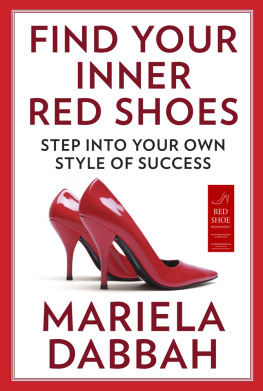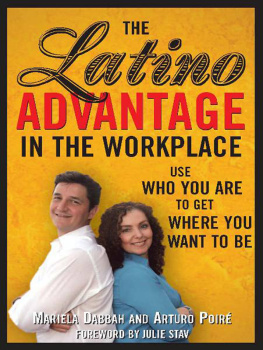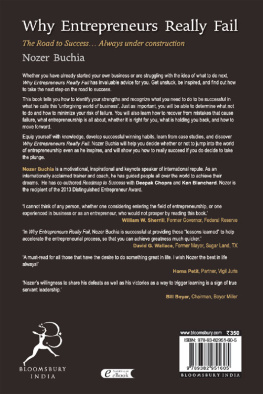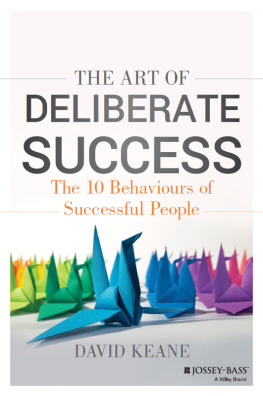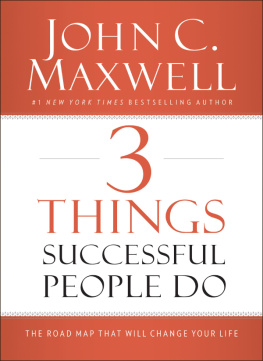C. A. PRESS
FIND YOUR INNER RED SHOES
Born in Argentina, Mariela Dabbah is an award-winning best-selling author, thought-leader, corporate consultant, and media contributor on issues of education, career development and empowerment with a focus on Latinos. Shes a sought-after international speaker and corporate trainer who has inspired diverse audiences to take the steps needed to fulfill their dreams. Dabbah is a frequent guest on CNN, Univision, Telemundo, Fox News, and all the major English and Spanish networks.
In 2009 she created Latinos in College, a nonprofit organization to help Latino students in the U.S. find everything they need to succeed in college. In 2012, after the publication of the Spanish-language edition of this book, she launched the Red Shoe Movement, an initiative that encourages women to wear red shoes to work on Tuesdays to signal their support for other womens career advancement. The goal is to move the needle on female representation at the highest levels of all types of organizations.
Aside from having published six books of nonfiction, Dabbah is also a fiction writer whose stories have been published in literary magazines and online. Her first book of short stories Cuentos de Nuevos Aires y Buena York (Metafrasta, 2006) has received wide public and critical acclaim and her first novel will be published soon. She lives in New York.
FIND
YOUR INNER
RED SHOES
Step into Your Own Style of Success
Mariela Dabbah
C. A. PRESS
Penguin Group (USA)
C. A. PRESS
Published by the Penguin Group
Penguin Group (USA) Inc., 375 Hudson Street,
New York, New York 10014, USA
USA | Canada | UK | Ireland | Australia | New Zealand | India | South Africa | China
Penguin Books Ltd, Registered Offices: 80 Strand, London WC2R 0RL, England
For more information about the Penguin Group visit penguin.com
First published by C. A. Press, a member of Penguin Group (USA) Inc., 2012
This English-language edition published 2013
Copyright Mariela Dabbah, 2012
Translation copyright Mariela Dabbah, 2013
All rights reserved. No part of this product may be reproduced, scanned, or distributed in any printed or electronic form without permission. Please do not participate in or encourage piracy of copyrighted materials in violation of the authors rights. Purchase only authorized editions.
Translation by Karen Tawil
ISBN 978-0-698-13699-1
While the author has made every effort to provide accurate telephone numbers and Internet addresses at the time of publication, neither the publisher nor the author assumes any responsibility for errors or for changes that occur after publication. Further, publisher does not have any control over and does not assume any responsibility for author or third-party Web sites or their content.
To my mother, Gabriela Abeles, to who I owe so much of my own success
To my friend Susan Landon, who has supported my writing for years behind the scenes
To Arturo Poir, because only an official dedication can express how significant his contributions have been
Everything passes and everything remains
But we can only pass
Pass making paths
Pathways over the sea
(... )
Wayfarer your footsteps are the path and nothing more
Wayfarer there is no path, the path is forged as you tread
By treading you make the path, and when glancing back
You see the path that youll never tread again
Wayfarer there is no path but waves on the sea
Caminante no hay camino
by Joan Manuel Serrat
(based on Antonio Machados
homonymous poem)
Introduction
I wrote this book with the intention of not creating another typical self-help book. You know what Im talking about, the kind that promises a magic potion that will change your life. Those books you read enthused at first, only to realize their strategy isnt going to work for you. Yours is a different case altogether. Of course, it cant be otherwise. Your case is special, only you walk in your shoes. So instead of reading these pages trying to copy the formula that worked for someone else, Id like you to read them trying to find clues to help you design your own journey. A journey that is good for you and only you. Its best to be open to the ideas Ill be presenting as well as to the voices of several others, who are mostly women. Select the ones whose journey or individual style appeals to you most. And do the same with the specific tools Ill share with you. These are strategies and concepts that worked for me and many other women who were able to find a successful path that lead to fulfillment and happiness. It is equally important to approach these newly identified wishes and goals with ease. Sometimes, when we suddenly realize what we want, we become anxious about time lost or annoyed with ourselves. To make up for it we try skipping over stages which, in turn, leads to greater frustration.
You should think about professional and personal success as a journey, not a destination; the journey each of us builds in order to experience what really pleases us. So if this book helps you find out what you want for yourself professionally, it will also help you find ways to align your wishes with actions you must perform to fulfill them. That same alignment is a success in and of itself, and it will make you feel more fulfilled than you did before, when you didnt know what you wanted professionally.
But lets start from the very beginning.
The word success derives from the Latin succedere which means come after and accomplishment of desired end.
And if we are going to discuss success, we need to talk about its opposite, failure, for its hard to fully capture the meaning of one without the other.
The word failure comes from the old French word faillir, which derives from the Latin fallere: to cause to fall or to disappoint.
For each person, success, that accomplishment of desired end, takes a different shape. Its a journey on which each of us embarks with our own singular style.
When we understand success in these terms, as embarking on a journey, a satisfactory way out for each one of us, its possible to move away from the simplistic success and failure dichotomy, which can ultimately create a suffocating no way out situation. On the other hand, when considering success as a destination (a goal to achieve) as opposed to failure (and considering that its parameters are defined by society, your parents, coworkers or anyone other than you), if you dont reach that destination, youre doomed to failure. For example, in American society one of the most common stereotypes is equating success with having certain material things: a house, a car, etc. Maybe its more satisfying for you to live in the city, in a rented apartment, getting around by public transport, and having the chance to enjoy cultural outings each evening. But if you stick to the conventional idea of success (like most people do), even if youre satisfied and happy with your city life, youll continue struggling to purchase a home in the suburbs.
Luca Ballas-Traynor, cofounder of MamasLatinas.com, a website that focuses on Hispanic womens needs, speaks about her own definition of success and leadership: Ill never forget the time when I told one of my bosses that as a woman I felt the way I was being treated, and the level of respect I was afforded, was different from that of the

